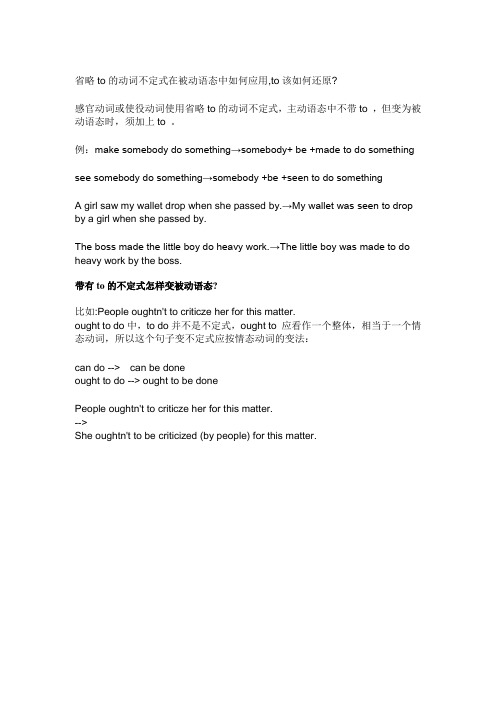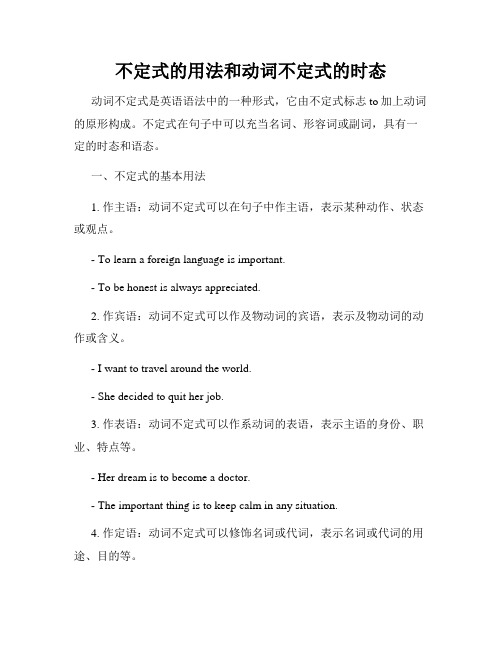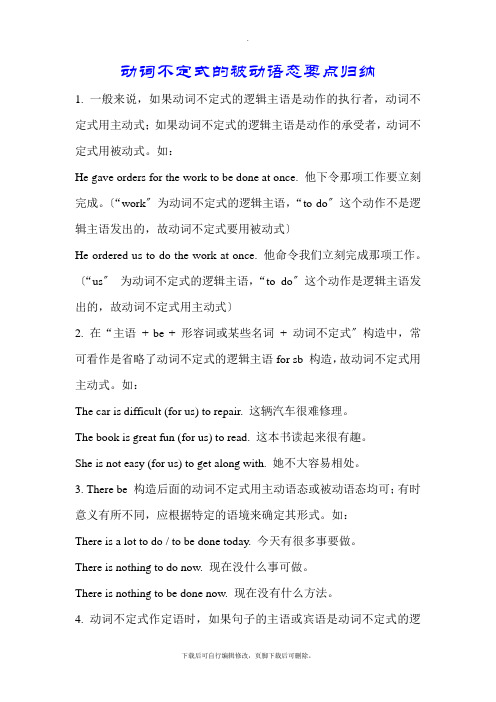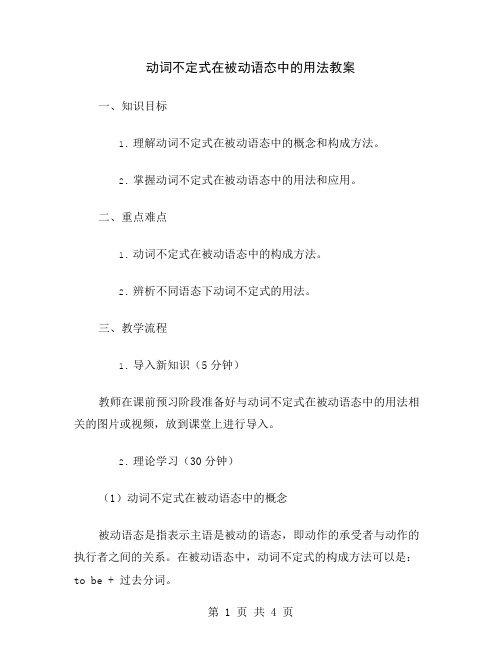动词不定式的被动语态
动词不定式的被动语态

省略to的动词不定式在被动语态中如何应用,to该如何还原?
感官动词或使役动词使用省略to的动词不定式,主动语态中不带to ,但变为被动语态时,须加上to 。
例:make somebody do something→somebody+ be +made to do something
see somebody do something→somebody +be +seen to do something
A girl saw my wallet drop when she passed b y.→My wallet was seen to drop by a girl when she passed by.
The boss made the little boy do heavy work.→The little boy was made to do heavy work by the boss.
带有to的不定式怎样变被动语态?
比如:People oughtn't to criticze her for this matter.
ought to do中,to do并不是不定式,ought to 应看作一个整体,相当于一个情态动词,所以这个句子变不定式应按情态动词的变法:
can do --> can be done
ought to do --> ought to be done
People oughtn't to criticze her for this matter.
-->
She oughtn't to be criticized (by people) for this matter.。
非谓语动词之动词不定式被动语态形

非谓语动词之动词不定式被动语态形一、复习各种时态的被动语态★ 被动语态的基本结构:be+ done(以the book , publish 为例)一般现在/过去时:The book is/ was p ublished一般/过去将来时:The book will/would be p ublishedThe book is/was going to be p ublished现在/过去进行时:The book is/was being p ublished现在/过去完成时:The book has/had bee n p ublished情态动词:The book can/could/may/might …be p ublished二、不定式的被动式的基础知识:1)一般式:(not/never )to be done2)完成式:(not/ never )to have been done (表示不定式动作发生在谓语动词之前)三、▲通常在believe, suppose, say, report等动词构成的句子中可以进行主动语态到被动语态以及被动语态和动词不定式的转换.如:They say that Mike is sick in bed.=lt is said that Mike is sick in bed.=Mike is said to be sick in bed.据说麦克卧床不起.People believe that he was killed.=It is believed that he was killed.=He is believed to have been killed.大家相信他被杀了.四、当不定式的逻辑主语是不定式所表示的动作的承受者而非发出者时,不定式一般要采用被动形式(to be done).语法功能:1.作主语:It is an honour for meto be asked to speak here.2.作宾语:She asked to be sent to work in Xinjiang.3•构成复合宾语:He wanted the letterShe didn ' t like herself4.构成复合谓语:The books are not allowed 5.作定语:to be typed at once.to be praised likethat.Are you going to the meeting 6.作状语: She was too young to be assigned such work. 五、不定式有时还可以有完成式的被动式 to have been done (表示该动作是发生在主 句之前的一个被动动作) ,在句中作主语、宾语、定语,或者构成复合宾语、复合谓语 等,如: It is a good thing for him to have been criticized. (主语) She preferred to have been given heavier work to do. ( 宾语 ) ) He thought it an honour to have been invited to the party. The book is said to have been translated into many languages. She was the first woman to have been elected to such a post. 六、不定式的主动形式表示被动 1.There be 结构中,用不定式的主动和被动式来修饰主语,区别不大。
动词不定式的主动与被动形式

动词不定式的主动与被动形式动词不定式是一种非谓语动词形式,它由动词原形加上不定式符号“to”构成。
在英语中,动词不定式的形式可以分为主动和被动两种形式,分别用来表示动作的主动或者受动关系。
本文将重点探讨动词不定式的主动与被动形式及其用法。
一、动词不定式的主动形式动词不定式的主动形式表示动作由主语主动完成。
它的一般形式是“to + 动词原形”,例如:1. I want to learn to play the guitar.(我想学弹吉他。
)2. She needs to work hard to achieve her goals.(她需要努力工作以实现她的目标。
)3. They decided to go on a vacation together.(他们决定一起去度假。
)动词不定式的主动形式常常用来表示目的、意图、计划等。
二、动词不定式的被动形式动词不定式的被动形式表示动作的受动关系,即动作的承受者是主语。
在使用被动形式时,需要在“to”之后加上动词的被动形式,即“tobe + 过去分词”,例如:1. She hopes to be invited to the party.(她希望被邀请参加派对。
)2. They want to be recognized for their achievements.(他们希望因他们的成就而受到认可。
)3. He pretended to be surprised when he heard the news.(他假装听到消息后感到惊讶。
)被动形式通常用来表示动作的客观存在、被动接受等。
三、动词不定式主动与被动形式的用法1. 用于目的和意图动词不定式的主动形式常用于表示目的和意图,强调主语的主动性。
例如:- I bought a book to improve my English.(我买了一本书来提高我的英语水平。
)- He practices yoga every day to stay healthy.(他每天练习瑜伽保持健康。
被动语态 动词不定式

(1)被动语态定义:被动语态是动词的一种特殊形式,用来说明主语与谓语动词之间的关系。
如果主语是 动作的执行者(即某人做某事),便叫主动语态;如果主语是动作的承受者(即某事被做),便叫被动语态。
主动与被动的区别不是词序的区别,而是主语与谓语意义上的区别。
在英语中只有及物动词和一些相当于及物动词的词组才有被动语态的形式。
(2)英语中被动语态由“助动词be +动词的过去分词”构成。
助动词be 有时态、人称和数的变化。
(1) 被动语态的用法:① 不知道谁是动作的执行者(即不知道谁做)时用被动语态,省略by 短语。
如:A man was killedin the accident.(一个人死于事故)/ This window was broken yesterday .(这扇窗子是昨天被打破的)②不说或者众所周知是谁做时,用被动语态,省略by 短语。
如:Rice is also grown in this place.(这个地方也种水稻)/ A railroad will be built here in three years .(三年之后这里将要修建一条铁路)③强调动作的承受者,句尾加by 短语。
如:It was written by Lu Xun.(它(书)是鲁迅写的)/ Apet dog is never killed by its owner .(宠物狗是不会被主人宰杀的)(3) 注意点:①“动词+间接宾语+直接宾语”改为被动时,可以用间接宾语做被动句的主语。
如:His teacher gave him a dictionary.→He was given a dictionary by his teacher .(老师给他一本字典→他得到老师一本字典)也可以用直接宾语做被动句的主语,但是需用to 或者for 引出原句的间接宾语。
如:His teachergave him a dictionary.→A dictionary was given to ..him by his teacher.(老师给他一本字典→一本字典由老师送给了他)/His father made him a kite.→A kite was made for ...him byhis father .(他的父亲给他做了一个风筝→一个风筝由他的父亲做给了他)②“动词+宾语+动词原形”改为被动时,动词原形前要加to.如:The boss made the poor man work 12 hours a day.→The poor man was made to ..work 12 hours a day .(老板让这个可怜的人一天工作12小时→这个可怜人被迫一天工作12小时)③“动词+…+介词”改为被动时,介词一般在原位不动。
不定式的用法和动词不定式的时态

不定式的用法和动词不定式的时态动词不定式是英语语法中的一种形式,它由不定式标志to加上动词的原形构成。
不定式在句子中可以充当名词、形容词或副词,具有一定的时态和语态。
一、不定式的基本用法1. 作主语:动词不定式可以在句子中作主语,表示某种动作、状态或观点。
- To learn a foreign language is important.- To be honest is always appreciated.2. 作宾语:动词不定式可以作及物动词的宾语,表示及物动词的动作或含义。
- I want to travel around the world.- She decided to quit her job.3. 作表语:动词不定式可以作系动词的表语,表示主语的身份、职业、特点等。
- Her dream is to become a doctor.- The important thing is to keep calm in any situation.4. 作定语:动词不定式可以修饰名词或代词,表示名词或代词的用途、目的等。
- I have a book to read.- We have a meeting to attend tomorrow.5. 作状语:动词不定式可以在句中作状语,表示目的、原因、结果、时间等。
- He exercises every day to stay healthy. (目的)- She cried so hard as to lose her voice. (结果)二、动词不定式的时态动词不定式有两种时态:一般时和完成时。
1. 一般时不定式:使用动词的原形表示不定式的一般时态。
- I hope to visit my grandparents next week.- She likes to read books in her free time.2. 完成时不定式:使用动词的完成时形式,由“to have + 动词的过去分词”构成。
动词不定式的被动语态要点归纳

动词不定式的被动语态要点归纳1. 一般来说,如果动词不定式的逻辑主语是动作的执行者,动词不定式用主动式;如果动词不定式的逻辑主语是动作的承受者,动词不定式用被动式。
如:He gave orders for the work to be done at once. 他下令那项工作要立刻完成。
〔“work〞为动词不定式的逻辑主语,“to do〞这个动作不是逻辑主语发出的,故动词不定式要用被动式〕He ordered us to do the work at once. 他命令我们立刻完成那项工作。
〔“us〞为动词不定式的逻辑主语,“to do〞这个动作是逻辑主语发出的,故动词不定式用主动式〕2. 在“主语+ be + 形容词或某些名词+ 动词不定式〞构造中,常可看作是省略了动词不定式的逻辑主语for sb 构造,故动词不定式用主动式。
如:The car is difficult (for us) to repair. 这辆汽车很难修理。
The book is great fun (for us) to read. 这本书读起来很有趣。
She is not easy (for us) to get along with. 她不大容易相处。
3. There be 构造后面的动词不定式用主动语态或被动语态均可;有时意义有所不同,应根据特定的语境来确定其形式。
如:There is a lot to do / to be done today. 今天有很多事要做。
There is nothing to do now. 现在没什么事可做。
There is nothing to be done now. 现在没有什么方法。
4. 动词不定式作定语时,如果句子的主语或宾语是动词不定式的逻辑主语,该动词不定式用主动式。
如:He has two letters to write tonight. 他今晚有两封信要写。
〔“He〞为动词不定式的逻辑主语〕You have given me much to read. 你让我看的东西已经很多了。
动词不定式与被动语态

语法复习动词不定式一. 定义:动词不定式是非谓语动词的一种,它没有人称和数的变化,在句子中不能独立作谓语,但它仍保持动词的特点,既可以有自己的宾语和状语。
同时动词不定式又具有名词、形容词、副词的特征,在句中可以作主语、表语、宾语、宾语补足语、定语和状语。
二. 动词不定式的构成:to+动词原形三. 动词不定式作宾语后面能接不定式作宾语的动词有:agree, ask, choose, decide, forget, hope, learn, want, wish, would like等。
We hope to get there before dark. 我们希望天黑以前到那儿。
The girl decided to do it herself. 那个姑娘决定自己做那件事。
动词不定式作宾语的注意事项(2点)1. 有些动词既可跟不定式作宾语,也可跟动名词作宾语,但含义不同:remember to do记住要做某事remember doing记得曾经做过某事forget to do忘记要做某事forget doing忘记曾经做过某事stop to do停下来去做某事stop doing停止做某事go on to do继续做另一件事doing继续做原来在做的事go on d oingseeing you somewhere before. I remember s eeing我记得以前在哪儿见过你。
to turn off the light when you leave. Please remember t o turn离开时请记得关好灯。
2. 不定式作宾语时,如带有宾语补足语,则要把不定式放到后面,用it作形式宾语,构成“主语+动词+it+宾补(形容词、名词)+不定式”结构。
如:He found it very difficult to get to sleep. 他发现很难入睡。
四. 动词不定式作宾语补足语等。
动词不定式在被动语态中的用法教案

动词不定式在被动语态中的用法教案一、知识目标1.理解动词不定式在被动语态中的概念和构成方法。
2.掌握动词不定式在被动语态中的用法和应用。
二、重点难点1.动词不定式在被动语态中的构成方法。
2.辨析不同语态下动词不定式的用法。
三、教学流程1.导入新知识(5分钟)教师在课前预习阶段准备好与动词不定式在被动语态中的用法相关的图片或视频,放到课堂上进行导入。
2.理论学习(30分钟)(1)动词不定式在被动语态中的概念被动语态是指表示主语是被动的语态,即动作的承受者与动作的执行者之间的关系。
在被动语态中,动词不定式的构成方法可以是:to be + 过去分词。
(2)动词不定式在被动语态中的用法1)作主语动词不定式在被动语态中可以作主语,表示被动动作的执行者。
例如:To be invited to the party is an honor.2)作表语动词不定式在被动语态中还可以作表语,表示被动动作的执行情况。
例如:My dream is to be loved by many people.3)作宾语动词不定式在被动语态中也可以作宾语,表示被动动作的执行对象。
例如:I want to be invited to the party.(3)不同语态下动词不定式的用法在主动语态中,动词不定式的构成方法是to+动词原形,而在被动语态中,要使用to be+ 过去分词的构成方法。
3. 实践操作(30分钟)(1)阅读练习请阅读下面的句子,然后选择合适的动词不定式填空:1)He hopes ________(invite) to the ball.2)It's said that the school will ________(close) for a week.3)I'd like _______(be) in the next game.4)The hotel ________(book) to capacity in winter.(2)写作练习请根据下列图示写一篇作文。
- 1、下载文档前请自行甄别文档内容的完整性,平台不提供额外的编辑、内容补充、找答案等附加服务。
- 2、"仅部分预览"的文档,不可在线预览部分如存在完整性等问题,可反馈申请退款(可完整预览的文档不适用该条件!)。
- 3、如文档侵犯您的权益,请联系客服反馈,我们会尽快为您处理(人工客服工作时间:9:00-18:30)。
★ 被动语态的基本结构: be+ done (以 the book , publish 为例) 一般现在/过去时:
The book _i_s_/ _w_a_s__p_u_b_li_s_h_e_d_____. 一般/过去将来时:
The book _w__il_l/_w_o_u_l_d__b_e_p_u_b_l_is_h__e_d____. The book _i_s_/w__a_s_g_o_i_n_g_t_o__b_e_p_u_b_l_is_h__e_d_. 现在/过去进行时: The book __is_/_w_a_s__b_e_in__g_p_u_b_l_is_h__e_d_____. 现在/过去完成时: The book _h__a_s_/h_a_d__b_e_e_n_p__u_b_li_s_h_e_d______. 情态动词:
15. It happened __to__b_e_r_a_i_n_in_g___ (rain) when I got there.
16. I am terribly sorry _to__h_a_v_e__lo_s_t_(lose) your key. 17. I am sorry _to__s_a_y_____(say )that he is going
3) I cannot go out now as I have a lot of clothes _t_o_w_a_s_h_____(wash)
3. 在下列情况中用不定式的主动形式表示被动意思。 2) 在“主语+表语(形容词)to do” 中, 主语也是 不定式的逻辑宾语,即不定式动词和主语之间是 动宾关系。
5. Dick sped on the motorway only __to__b_e_f_in_e_d___ (fine).
6. When some money went missing from the bank, Thomas was believed _to__h_a_v_e__s_to_l_e_n__ (steal) it.
11.When I came in, he pretended to _b_e__re_a_d__in_g____.(read)
12.All these gifts must be mailed immediately _to__b_e__re_c_e_i_v_e_d_(receive) in time for Christmas.
It is a great honor to be invited to attend the opening ceremony of Asian Games. 2) 做表语 The party is to be held next Saturday evening. 明年, 这种新药将在500个过度肥胖的人上进行试验。
into the university 20. He got to the station only _t_o_f_in_d___(find) all
the tickets had been sold out. 21. I am sorry __to__h_a_v_e_k_e_p_t_____(keep) you
1) I’ll go to New York. Have you anything _t_o__b_e_t_a_k_e_n__(take) to your wife there?
2) Have you any clothes _to__b_e_w__a_s_h_e_d_(wash), sir?” asked the maid
The book _c_a_n_/c_o_u_l_d_/m__a_y_/m__i_g_h_t…__b_e__p_u_b_l_is_h_e_d_.
二、动词不定式的被动语态
1. 动词不定式的被动语态有两种形式:
1)一般式 (not/never )to be done
2)完成式 (not/ never) to have been done (表示不定式动作发生在谓语动词之前)
The armchair is comfortable to sit in 这题目很难算出来。
The question is difficult to work out
4. There be 结构中,用不定式的主动和被 动式来修饰主语,区别不大。
There is a lot of work to do / to be done. (多用主动形式) 没有什么可担心的。
The elegant lady had something to declare.
★ 注意:若句子的主语并非不定式的逻辑主语时, 不定式则必须用被动式。
★ 比较: I have a lot of letters to type . (我有很多信件要打印:I will type the letter) I have a lot of letters to be typed. (意思为: I get sb. to type the letter)
waiting so long.
22.On their return the father asked his son to_e_x_p_l_a_in___(explain) what he had learnt.
23.My advisor encouraged me _t_o_t_a_k_e___(take) a summer course to improve my writing skills.
The new drug is to be tested out on the 500 overweight people next year.
3) 做宾语 She didn’t like to be treated as a child. He pretended to have been beaten by his step-father. 这位职员不希望被她的顾客嘲笑。 The clerk wouldn’t like to be laughed at by her customers
There is nothing to worry about.
练习
1. It will take several weeks for your computer to _b_e_r_e_p_a_i_re_d___ (repair).
2. I knew him _t_o_h_a_v_e__b_e_e_n_c_a_u__g_h_t_ (catch) by the police.
3. A vote is required _t_o_b__e_t_a_k_e_n____(take) in our company at once.
4.This makes it possible for them _to__m_a_k_e__(make) metals into any required shapes.
7. I hope _t_o_b_e__a_d_m_i_t_te_d___(admit) to Zhongshan University.
8.The book is said to _h__a_v_e_b_e_e_n__tr_a_n_s_l_a_te_d__ (translate) into several languages.
2. 动词不定式的被动语态在句子中的作用 1) 做主语(常用it做形式主语) To be offered sympathy by a robot is ridiculous.
It is ridiculous to be offered sympathy by …. 被邀请参加这个亚运会开幕式,是一大荣幸。
24.I don’t know whether you happen _t_o__h_a_v_e_h_e_a_r_d__(hear), but I’m going to study in the U.S.A this September.
25.The flu is believed _t_o_b__e_c_a_u_s_e_d__(cause) by viruses that like to reproduce in the cells inside the human nose and throat.
from bad to worse. 18. He asked __to__b_e_s_e_n_t_____(send) to the place
where he was most needed. 19. What he hoped was _to__b_e__a_d_m_i_tt_e_d__(admit)
He hurried to the booking office only to be told that all the tickets had been sold out.
3. 在下列情况中用不定式的主动形式表示被动意思。 1) 不定式作后置定语,与被修饰的名词或代词构成 逻辑上的动宾关系,但又与该句主语(或另一名 词/代词)构成逻辑上的主谓关系时, He has nothing to eat. 分析: eat 动→nothing宾 / he 主→eat 谓 I will give you a book to read . 分析: _re_a_d__ 动→_a__b_o_o_k__宾/ _y_o_u__主→_r_e_a_d_谓 这个优雅的女人有事情要宣布。
13.Mrs Smith warned her daughter _n_o_t_t_o_d__ri_v_e____(not drive) after drinking.
14. Hearing the good news, he was too excited _to__s_p_e_a_k_____ (speak).
9.I feel greatly honored _t_o__b_e_w__e_lc_o_m__e_d___ (welcome) into their society .
